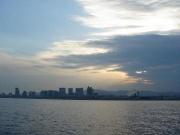

Subscribe to SCP News
Persistent Organic Pollutants (POPs)

The Regional Activity Centre for Sustainable Consumption and Production (SCP/RAC) has been a Stockholm Convention Regional Centre since 2009. This convention is an international treaty aimed at protecting human health and the environment from the harmful effects of persistent organic pollutants (POPs).
Persistent organic pollutants, or POPs, are chemicals with the following characteristics:
- Persistent: they remain intact for exceptionally long periods of time.
- Volatile: they become widely distributed throughout the environment reaching areas where they were neither produced nor used.
- Bioaccumulative: they accumulate in the fatty tissue of living organisms.
- Highly toxic.
If humans are exposed to POPs the effects on health can be serious, including cancers, birth defects, dysfunctional immune and reproductive systems, greater susceptibility to disease and even diminished intelligence. For this reason the international community, specifically the United Nations, have set up important instruments to regulate and control their use. The most important is the Stockholm Convention, which was adopted on 22 May 2001 and entered into force on 17 May 2004, and requires its parties to take appropriate measures to eliminate and reduce the release of POPs into the environment.
As a Stockholm Convention Regional Centre, the SCP/RAC works to help parties to the Convention, both developing and transition economy countries, to fulfil their obligations under the Convention, through capacity building and technology transfer.
Prior to being designated Regional Centre, the SCP/RAC was already working in this area, and under the new mandate is setting up a network of partners for collaboration, such as other Stockholm Convention Regional Centres, Cleaner Production Centres and Basel Convention Regional Centres. This prevents duplication of effort and promotes synergy with the Rotterdam and Basel Conventions, following the decisions made by the Conference of the Parties (COP) to the three Conventions.
The Stockholm Convention currently regulates the following POPs:
- Pesticides: aldrin, chlordane, DDT, dieldrin, endrin, heptachlor, hexaclorobenzene, mirex, toxaphene, chlordecone, alpha hexachlorocyclohexane, lindane, pentachlorobenzene.
- Industrial chemicals: hexaclorobenzene, polychlorinated biphenyls (PCBs), hexabromodiphenyl ether and heptabromodiphenyl ether; pentachlorobenzene, perfluorooctane sulfonic acid, its salts and perfluorooctane sulfonyl fluoride; tetrabromodiphenyl ether and pentabromodiphenyl ether.
- By-products: hexachlorobenzene, polychlorinated dibenzo-p-dioxins and polychlorinated dibenzofurans (PCDD/PCDF), PCB, alpha hexachlorocyclohexane, beta hexachlorocyclohexane and pentachlorobenzene.














